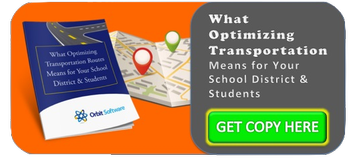Plan Safer Field Trips With 3 Simple Driver Strategies
published on April 11, 2014 by Sonia Mastros
school management system, bus driver, school bus driver
For hundreds of years, field trips have been a tried and true teaching technique. Taking students  out of a classroom and into a "real world" situation has always been a good way of reinforcing the lessons, and showing that they aren't just abstract exercises.
out of a classroom and into a "real world" situation has always been a good way of reinforcing the lessons, and showing that they aren't just abstract exercises.
Unfortunately, field trips are always going to be less safe for your students than your regular daily bus routes. It just goes with the territory, when you're taking students out of your district and to other locales. However, proper planning beforehand can reduce any safety problems to minor concerns.
Most of the preparations are bureaucratic in nature - compiling student lists, getting permission forms, and planning lessons. However, the transportation itself requires special care.
With some pre-planning, your students can enjoy safe and educational field trips with an absolute minimum of extra risk.
Three Ways To Ensure Safer Field Trip Transportation
1 - Use Buses, Not Parent Cars
When a school is trying to plan a field trip on a budget, it can be tempting to recruit volunteer parents as drivers. After all, if they're paying for their own time and gas, that's less for the school to cover.
However, this is a poor idea for several reasons.
To begin with, school buses are far safer for children on the road than standard cars. Their large size and heavy weight makes them difficult to roll, and resistant to crumpling or other damage in the event of a collision. They're built to be as indestructible as is practically possible.
In fact, according to one study by the National Highway Traffic Safety Administration in 2009, only 1% of student fatalities during a school day occurred on buses, versus 23% in private vehicles. The safety difference is overwhelmingly clear.
Further, all a school's insurance coverage becomes irrelevant for students in the cars of parent drivers. In the unfortunate event of an accident, liability would fall entirely on whoever is driving the car. If that parent lacks proper coverage, it could be disastrous for the students in the vehicle, as well as their own parents.
Your bus drivers are the people who are best-trained and most able to safely drive students on a field trip. Use them.
2 - Use GPS To Plan And Execute The Routing
The most reliable way of ensuring your students get to and from a field trip safely is GPS-based navigation, especially if it's a field trip into the countryside. In-bus GPS units ensure your bus drivers have all the information they need for the trip.
When you use electronic maps and GPS routing to plan the field trip, you'll have the opportunity to explore different routes and pick the safest options. For example, having buses on major highways is generally a bad idea. It's worth taking a little more time to avoid major roads.
Likewise, in-bus GPS allows drivers to quickly route around any obstacles in the way. If a road turns out to be closed for construction (which is always a possibility) or an accident has traffic backed up for miles, your drivers can still reach their destination in a minimal amount of time.
A bus driver heading on field trips is most likely going into unknown driving territory. GPS keeps them safer, especially on roads they've never driven before.
3 - Know Your Road Hazards
Driving on unfamiliar roads is especially dangerous because of the wide variety of conditions those roads present. Dirt roads, gravel, wet streets, and potentially even ice are all potential hazards your drivers will face when they're away from your district.
While these are all problems they might face in their everyday routes, the dangers are significantly increased when the bus is miles away from your school and, therefore, out of range of most support beyond voice communications.
We suggest choosing your bus drivers based on those who can most successfully adapt to changing conditions. On a field trip, your drivers are much more likely to face situations where they have to "think on their feet" without much outside help, so pick those who are up to the challenge!
While it's a good idea in general, some remedial training and refresher testing that covers proper driving habits under different conditions can help a lot here. It also will tell you which drivers will be best for your field trips, if you're in doubt.
Informed Drivers Create Safe Field Trips
The watchwords here are planning, thoroughness, and communication. When your bus drivers are armed with all the information they need, backed up with GPS routing, your field trips are far more likely to be successful.
Remember to keep in touch with your drivers throughout the trip, and be available to respond if unexpected situations crop up. This combination of modern technology and old-fashioned oversight will keep your students safe.



